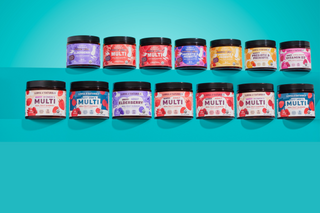Key Points
- Many children don’t eat enough magnesium-rich food, and as a result, they’re deficient in magnesium.
- Magnesium for kids supports so many aspects of their growth and development, and a deficiency severely impacts their health.
- Increasing their intake of foods high in magnesium is a good start.
- However, it’s worth consulting with your pediatrician to find out if you should add a magnesium supplement to help them reach healthy levels.

Magnesium is one of the essential nutrients your child needs to grow up healthy and strong. Magnesium for kids is especially important as their little bodies are going through so much intense development.
And its benefits go way beyond the physical too. If your child is behaving badly or is depressed or anxious — which, let’s face it, is never fun for anyone — the solution might be as simple as a magnesium supplement.
Let’s explore how magnesium for kids can support your little one’s health. We’ll also look at some symptoms of magnesium deficiency and how you can boost your child’s intake of magnesium to make sure they’re getting enough.
Why Your Child Probably Has a Magnesium Deficiency
The bottom line is that most children don’t eat enough magnesium-rich foods — which isn’t really surprising given that spinach, bran flakes, and beans feature heavily there. After all, they’re not the types of food that generally appeal to your little one’s palate (if they do, thank your lucky stars). To make matters worse, studies have shown that the nutrient content of the soil in which our food is grown has declined over the last few decades.
On top of that, you may accept stress as a natural part of adult life, but as you will have experienced firsthand, children get stressed too. A simple change in their physical environment or conflict around them can be enough to trigger that stress reaction. In these times, the body uses up a whole lot more magnesium. Sweat also uses magnesium, whether it’s caused by stress or simply a high level of physical activity.
Add all that together, and you have a recipe for magnesium deficiency. In fact, low magnesium levels are common in the U.S., with more than 50% of adults and children not getting enough. And with the global challenges we’re all experiencing right now, magnesium for kids has never been more important.
Signs of Magnesium Deficiency

Magnesium is critical to so many aspects of your child’s life and development, and low magnesium levels can have fairly severe effects on their health.
If your child’s magnesium levels are too low, you’re likely to see some of these symptoms:
- Low energy or fatigue
- Muscle cramps or tension
- Muscle weakness
- Growing pains
- Twitches, especially in small muscles, like those in the eyelid
- Teeth grinding
- Constipation
- Migraines
- Inability to concentrate
- Hyperactivity or ADHD
- Excessive fidgeting or restlessness
- Insomnia or disturbed sleep patterns
- Anxiety, sometimes to the point of panic attacks
- Apathy or depression
- Irritability or aggression
- Sensitivity to noise
Of course, there could be other reasons for these symptoms too, but if you do notice any of them — especially if the symptoms are serious — it’s worth talking to your doctor about whether a magnesium supplement could help. After all, magnesium for kids provides so many benefits.
Benefits of Magnesium for Kids

On the other side of the equation, let’s look at some of the benefits of getting enough of this critically important nutrient. Magnesium:
- Helps form antibodies, which supports the immune system
- Along with calcium, promotes the growth of bone mass and density, especially in adolescents
- Helps support protein synthesis, which is necessary to build strong and healthy muscle
- Helps regulate the heart rhythm and keeps the cardiovascular system healthy
- Supports focus and concentration
- Helps reduce stress and promote calm and relaxation
- Triggers the production of melatonin and helps regulate GABA, a neurotransmitter that promotes good sleep
- Is involved in managing blood pressure and blood sugar
- Helps with energy production to maintain energy levels
- Acts as a gentle laxative to help regulate bowel movements
- Maintains nerve function and regulates the nervous system
- Helps the body absorb and use other essential nutrients like iron, potassium, zinc, calcium, and vitamin D
- Helps to manage depression, anxiety, and ADHD
- May reduce the risk of autism spectrum disorders; however, further research in progress may help clarify initial findings
That list alone should be enough to convince you that boosting your child’s magnesium intake could change their (and your) life.
How Much Magnesium Does Your Child Need?
According to the National Institute of Health, the amount of magnesium your little one needs per day depends on their age:
- Age 0-6 months: 30 milligrams
- Age 7-12 months: 75 milligrams
- Age 1-3: 80 milligrams
- Age 4-8: 130 milligrams
- Age 9-13: 240 milligrams
- Age 14-18: 360 milligrams for girls and 410 milligrams for boys
For reference, 2 tablespoons of peanut butter has 49 milligrams of magnesium, and a medium banana has 32 milligrams of magnesium. And an ounce of roasted pumpkin seeds (about a quarter cup) has a whopping 156 milligrams of the good stuff.
The good news is that they don’t have to get that much magnesium every day. Aim for a good weekly intake, and it should balance out.
Whole Food Sources of Magnesium for Kids

To keep their levels of magnesium up, it’s a good idea to limit or avoid most of the foods that deplete magnesium stores. That includes anything that’s processed and/or high in salt and sugar, including soft drinks. Your child will probably protest (especially if they’re low on magnesium) but remind yourself that it’s all for a good cause.
Then start including more magnesium-rich whole foods in your child’s diet. These whole foods are great sources of magnesium for kids:
- Leafy green veggies, like spinach
- Broccoli
- Legumes, like black beans, black-eyed peas, or kidney beans
- All-bran cereal or oats
- Whole-grain bread rather than white (processing reduces magnesium content)
- Brown rice
- Nuts, like cashews, almonds, brazil nuts, and peanuts
- Seeds, like sunflower, pumpkin, and chia seeds
- Soy milk
- Yogurt
- Bananas
- Tofu
- Dark chocolate or cocoa powder
You may need to disguise these cleverly to get your kids to eat them. For example, try blending spinach into a smoothie with a banana and some soy milk or yogurt for a “magic green smoothie.” You could add some cocoa powder and make a healthy “chocolate milkshake.” Or make whole-grain sandwiches spread with peanut butter and a touch of honey, cut into interesting shapes.
Magnesium Supplements for Kids

Even with some strategic kitchen moves, you’ll probably struggle to get enough magnesium into your little one’s diet.
Luckily magnesium dietary supplements are freely available and relatively inexpensive. Note, however, that you should consult your pediatrician before giving a dietary supplement to your child.
Magnesium for kids comes in many different forms. Magnesium oil, lotion, or sprays work well for younger kids and are absorbed directly through the skin, so it can quickly enter the bloodstream. Older children can manage tablets or chewable gummies.
There are also different types of magnesium for kids, with magnesium citrate being one of the most bioavailable.
Whatever type of magnesium you and your pediatrician decide on, make sure you’re buying a high-quality supplement. Dietary supplements are regulated differently to food by the US Food and Drug Administration (FDA), so it’s worth doing your research to check that you’re buying from a reputable brand.
Magnesium for kids works well in combination with high-quality multivitamin supplements too, like Llama Naturals Multivitamin Gummies. Llama Naturals gummies are organic and made from real fruit and veggies, slow-cooked to retain all the nutrients. They’re also free from any nasties like sugar or artificial sweeteners, as well as artificial colors or flavors, preservatives, gluten, and other common allergens.
Important notes:
- The magnesium content of the various types of dietary supplements varies quite widely. It’s therefore important to read the dosage instructions carefully to make sure you’re giving your child the right amount of magnesium for their age. Too much and they might end up with side effects like stomach cramps or diarrhea.
- Be aware that magnesium can interact with certain medications, like antibiotics and diuretics. So if your child is on medication for any reason, please consult your pediatric health care professional before putting them on dietary supplements.
Magnesium for Kids Can Dramatically Improve Your Child’s Health
Magnesium deficiency is common in the United States, and its impact on kids’ health is widespread. Increasing levels of magnesium for kids helps them grow strong bodies, stay focused throughout their day, and manage their moods better.
It’s possible to increase magnesium through eating more magnesium-rich food, however, your child probably still needs a magnesium supplement to make sure they’re getting enough of this critical nutrient. Find one they love and they’ll be well on their way to a healthy body and a mind that keeps them alert and curious about exploring the world they live in — which, as kids, is really their main job.
Visit Llama Naturals for more ways to give your child the nutrition they need every day — like our Simply Strawberry Llama Naturals Plant-Based Multivitamin, with 13 essential nutrients. They’ll be begging you for more.
Llama Naturals is a plant-based nutrition brand that has created the World's First Whole Fruit Gummy Vitamins that are made with no added sugar and whole-food vitamins. They are USDA Organic, Vegan, Gluten Free, free of common allergens, and are slow-cooked on low heat to retain rich phytonutrients & fruit flavor. It’s a win-win gummy vitamin that you and the family will love.







